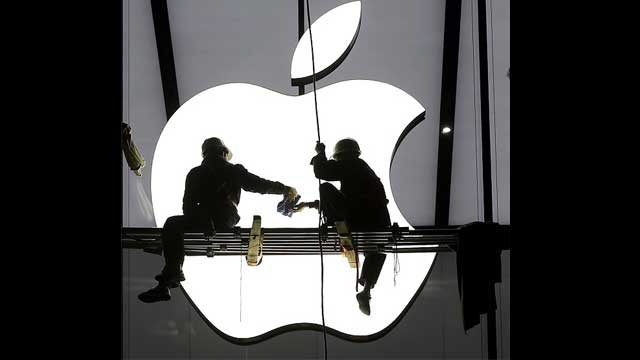(Reuters)
Amid the raging JNU row, many have been asked, will the US allow an anniversary of terrorist Osama Bin Laden or anyone raising anti-US slogans?

Even as India is discussing sedition, nationalism, freedom of expression vis-à-vis the JNU row, an interesting debate is unfolding in the US with regards to Apple's iPhone encryption. While the two cases may seem unrelated at first, the core point in them is the same - nationalism.
Most of us know the details of the JNU row, but let’s do a small recap. Kanhaiya Kumar and five other students of the Jawaharlal Nehru University have been, after a video surfaced of slogans like "Pakistan Zindabad, Bharat ki barbaadi tak jung hamari jaari rahegi and Bharat tere tukde honge" being raised. It is the police’s case that Kanhaiya and his colleagues participated in these slogans, held on the anniversary of Afzal Guru’s hanging, held at the JNU campus in Delhi. For those uninitiated, Afzal Guru was convicted for his role in the 2001 attack on the Indian Parliament and was hanged for the same in 2013.
Following this, there has been an uproar on social media and television channels, and these students and anyone who is remotely supportive of them, are being declared as "anti-nationals". Our politicians are debating this angrily everywhere and so are the people of India. The battle lines are drawn and the atmosphere is quite vicious. Lawyers have taken the law into their hands and have assaulted journalists, accusing them of supporting "anti-nationals". Anyone who points out that the students (not necessarily Kanhaiya and his colleagues arrested so far) merely raised slogans, is being asked - would the US allow an anniversary of terrorist Osama Bin Laden or anyone to raise anti-US slogans?
ALSO READ New York drug case: Judge backs Apple in encryption fight; says US govt can't force to unlock iPhone
Now let’s look at the case in the US that I am trying to draw a parallel with.
On December 2 last year, Syed Rizwan Farook and his wife Tashfeen Malik targeted a San Bernardino Pubic Health Centre party where over 80 persons had gathered. The assault by Farook and his wife killed 14 people and 22 person were injured. In a subsequent shootout, the couple was killed and the police recovered two guns, a few thousand rounds and few explosive devices. They also found an Apple iPhone 5c which was used by Farook. When the FBI tried to access the phone and the iCloud data, it couldn’t do so due to the in-built security features and a mistake by the Department of Justice personnel who tried to reset the password. The, the manufacturers, to create a system that would give them access to the phone. However, Apple has been steadfast in refusing to do anything that would compromise its customers’ security.
ALSO READ Being hard doesn't scare us: Apple CEO Tim Cook on iPhone encryption
Interestingly, Salihin Kondoker, a San Bernardino survivor’s husband, has submitted a petition before the court on behalf of Apple, that the FBI should not decrypt the phone. He says, the phone was being used by Farook for work and there was little chance he would store any valuable information over there. He points that the couple had destroyed their personal phones and the San Bernardino County had full details about the GPS location of Farook and his wife. He also says he unhappy about the way the FBI has handled the investigation so far.
Separately, the FBI has held that both Farook and his wife were homegrown violent extremists and were inspired by foreign terrorist groups.
ALSO READ Donald Trump calls for boycott of Apple products till company helps unlock shooter's phone
Apple has been supported in its stand by Google (that rivals Apple in OS domination), Facebook and Twitter in its refusal to grant access to the FBI.
Now let’s imagine this happened in India. Let’s look at some possible reactions first.
“How could Apple say no? This is a national security issue. Those guys were terrorists. Burn down Apple. Stop using iPhones. Anti-national company. Don’t allow them to sell here.”
When compared to reactions of family members of terror victims in India, who unfailingly demand the most punitive action against anyone who is even seemingly complicit in an attack, the reaction of the San Bernardino survivor’s husband supporting Apple is quite surprising. He doesn’t find it strange that Apple has a stance against decrypting the iPhone used by the terror couple.
Ofcourse, there will be talk about Apple being the capitalists that they are and how they care for their business more than the country. It will be quite shrill.
However, before you laud the US response to the issue, let’s not forget - Donald Trump, who is by far the mostrunning in their upcoming elections, may well be the next US President.